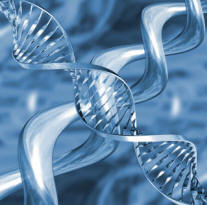LIFE IN THE MATERIAL
WORLD
Introduction |
Developing Body, Emerging Spirit
|
Forgetfulness of the Past
Necessity of Material Life |
The Meaning of our Suffering |
Moments of Liberation
Developing Body, Emerging Spirit
|
Through the process of a
spirit's
union with the fetus, and the completion of such material ties at birth, a
spirit's faculties are limited by the new
body that the spirit inhabits, and these faculties, of both a physical and
intellectual nature, will only be able to manifest in accordance with the
physical development of the body. Some faculties can even remain
"abnormally" limited, for example, in the case of mentally and physically
challenged persons. In the latter case, such conditions represent a trial or expiation,
either chosen by the spirit or imposed
upon it, if necessary.
The underdeveloped body of a
child, however, does not cause the spirit to suffer, for this is like a time of
rest for the spirit. The periods of infancy and childhood serve several
purposes, all stemming from their temporary masking of the spirit's past and true
nature. For one thing, the "innocence", tenderness, and fragility of a child serve to call for the attention and
loving care of its parents. Parents and caregivers would not react the
same way to a child if the "not-so-charming nature" of that child's spirit were
immediately revealed.
|
|
 |
A second reason for childhood is
to allow the spirit a period of adaptation. On one hand, the spirit must adapt
to the change from the liberties it experienced in the spiritual realm to the
limits it experiences in the material world. Secondly, the spirit of a
newborn may come from a past in which it acquired habits (cultural habits, for
example) totally different from that of the newborn's parents, and this stage will allow
the spirit to learn and adapt to the
latter.
Finally, this period offers a
child the opportunity to be influenced by those who are entrusted with his or
her care and education. At this
stage, and particularly before the age of 7, a child's spirit is more impressionable.
The influence of its past has not fully emerged. Therefore, the new impressions
that the spirit receives have a greater chance of influencing the child's
personality. During this time, if a child is under the advice and guidance
of those with experience, then tendencies toward wrong-doing, brought by that
child's spirit, are re-directed, and the spirit's
faulty characters may be gradually reformed.
Question 385 of "The
Spirits' Book" asks, "Why does the character of young people change,
especially as they go through adolescence? Is it the spirit that
changes?" The spirits answer that "the spirit, as it regains
self-awareness, reveals itself as it was before incarnation.... After fifteen or
twenty years, children no longer need [the same degree of protection and
assistance from their parents], and their real characters begin to
emerge." At this point, the young person makes his way toward
adulthood where he will truly be able to exercise his free will and chose the
direction that his life will take. Hopefully, the individual has received a proper
education from his parents, one that will help him make good decisions along the
way.


